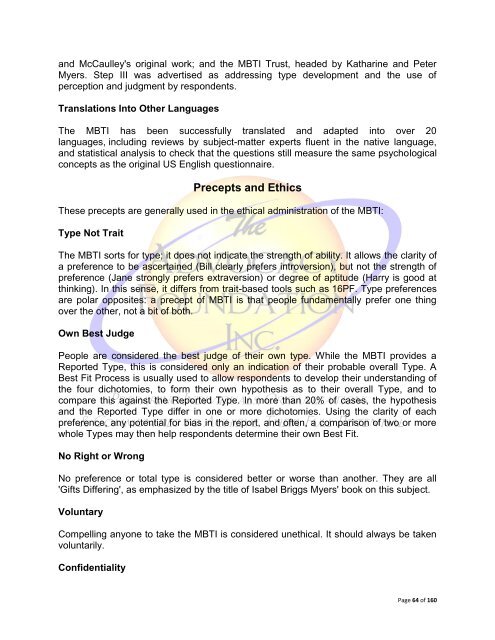The Gift of Introversion
The Gift of Introversion
The Gift of Introversion
Create successful ePaper yourself
Turn your PDF publications into a flip-book with our unique Google optimized e-Paper software.
and McCaulley's original work; and the MBTI Trust, headed by Katharine and Peter<br />
Myers. Step III was advertised as addressing type development and the use <strong>of</strong><br />
perception and judgment by respondents.<br />
Translations Into Other Languages<br />
<strong>The</strong> MBTI has been successfully translated and adapted into over 20<br />
languages, including reviews by subject-matter experts fluent in the native language,<br />
and statistical analysis to check that the questions still measure the same psychological<br />
concepts as the original US English questionnaire.<br />
Precepts and Ethics<br />
<strong>The</strong>se precepts are generally used in the ethical administration <strong>of</strong> the MBTI:<br />
Type Not Trait<br />
<strong>The</strong> MBTI sorts for type; it does not indicate the strength <strong>of</strong> ability. It allows the clarity <strong>of</strong><br />
a preference to be ascertained (Bill clearly prefers introversion), but not the strength <strong>of</strong><br />
preference (Jane strongly prefers extraversion) or degree <strong>of</strong> aptitude (Harry is good at<br />
thinking). In this sense, it differs from trait-based tools such as 16PF. Type preferences<br />
are polar opposites: a precept <strong>of</strong> MBTI is that people fundamentally prefer one thing<br />
over the other, not a bit <strong>of</strong> both.<br />
Own Best Judge<br />
People are considered the best judge <strong>of</strong> their own type. While the MBTI provides a<br />
Reported Type, this is considered only an indication <strong>of</strong> their probable overall Type. A<br />
Best Fit Process is usually used to allow respondents to develop their understanding <strong>of</strong><br />
the four dichotomies, to form their own hypothesis as to their overall Type, and to<br />
compare this against the Reported Type. In more than 20% <strong>of</strong> cases, the hypothesis<br />
and the Reported Type differ in one or more dichotomies. Using the clarity <strong>of</strong> each<br />
preference, any potential for bias in the report, and <strong>of</strong>ten, a comparison <strong>of</strong> two or more<br />
whole Types may then help respondents determine their own Best Fit.<br />
No Right or Wrong<br />
No preference or total type is considered better or worse than another. <strong>The</strong>y are all<br />
'<strong>Gift</strong>s Differing', as emphasized by the title <strong>of</strong> Isabel Briggs Myers' book on this subject.<br />
Voluntary<br />
Compelling anyone to take the MBTI is considered unethical. It should always be taken<br />
voluntarily.<br />
Confidentiality<br />
Page 64 <strong>of</strong> 160

















